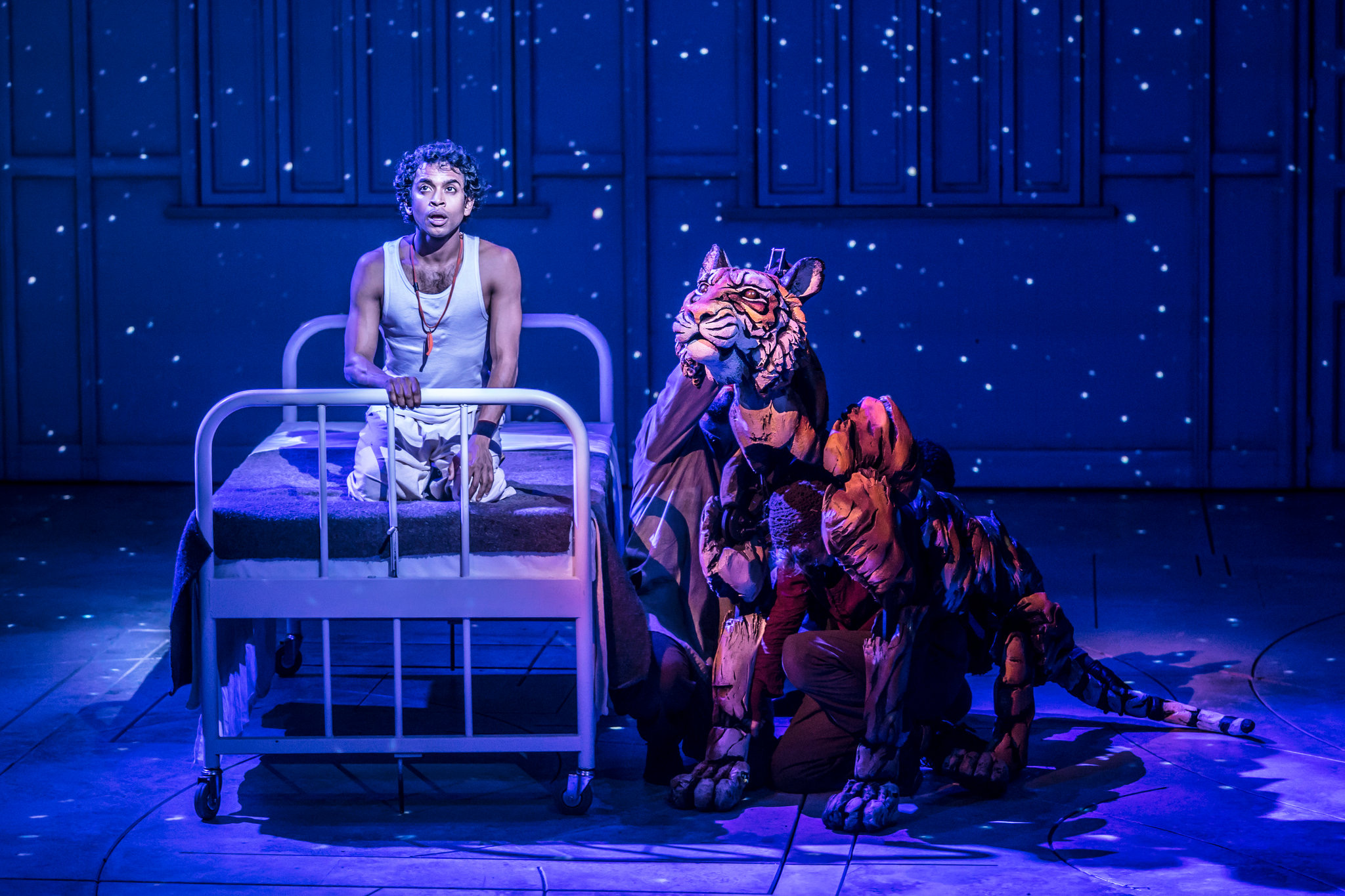THE LIFE OF PI
Based on the novel by Yann Martel
Adaptation by Lolita Chakrabarti
Direction by Max Webster
Gerald Schoenfeld Theatre
Official Website
Reviewed by David Spencer
High seas adventure. Eastern culture. Puppet animals. Extravagant theatricality. Philosophy. Alternate realities. Hit British import. Based on an international bestseller that also spawned an internationally successful hit movie.
The Life of Pi.
What’s not to like?
Well, that depends.
Despite the rave reviews and an enthusiastic audience reaction that cannot be denied, there is a good deal of eye-of-the-beholder to factor in. The story—adapted by Lolita Chakrabarti from the novel by Yann Martel—is both simple and complex. Pi is a young man, son of a zookeeper in India. Come 1976 and the political climate convinces his father that it’s time to sell the zoo and emigrate to Canada. The family board a ship, taking some of the animals, in crates, with them—father plans to sell them in the new country and settle into a new life. I’ll skip spoilers—even though The Life of Pi has become a world-famous story—and say only that events, to put it mildly, do not go as planned. And Pi winds up spending over 200 days at sea. In a large lifeboat. In the company of a vicious Bengal Tiger.
I wanted very much to be blown away by The Life of Pi. And while I found myself engaged, I did not find myself…how to say this…fully transported. I was rarely so into the illusion that I lost front-of-the-mind awareness of the puppeteers; and I was likewise conscious of every technique applied to creating illusion. And that I wasn’t surprised took me by surprise. More surprisingly, I learned of several other theatre colleagues—of some significance—who were even less affected than I.
And I had to think about why that might be.
The first thing that struck me is this: I and those particular colleagues are all of a certain age, and all very familiar with this kind of genre storytelling…and we’ve all seen stuff like this before. We’re all active fans of it. Speaking for myself, the puppetry was exactly as I expected it to be.
All right then…a generational divide, perhaps. Certainly not a universally felt one…yet for some, it will exist.
But it went deeper.
Aside from Adi Dixit as Pi—who is indeed quite extraordinary, managing to combine adolescent insecurity with mature wit—the rest of the performances are…again, how to say this…utilitarian. Each actor fills the function of his or her role without meaningfully filling the deeper humanity of the role. They don’t go much beyond the archetype: Blustery father, cynical interrogator, sympathetic counselor, heavily French-accented baddie…
Again, I had to think about why my cadre of colleagues and I perceived this primary color portraiture as a distraction while the audience had no problem.
What strikes me here: For all the “adult” plot points, The Life of Pi is no less fanciful a tale than Pinocchio. It hits its general audience in the place where even adults are children who want to believe in simple effects that evoke myth and magic. This kind of thing is the lifeblood of TYA, of Theatreworks/USA. And to varying degrees, those who love theatre never outgrow the romance of suggestion. In that context, sometimes nuance is the last thing you need—you’re better off with unambiguous clarity. The Life of Pi, then, might be construed as an event that, by dint of its production values, takes that to the next level (The Lion King takes it a level above that, but I digress.)
There are, though, some of you out there—not most of you, just some of you, perhaps (and probably) no more than a fraction of you—who will not be swept away along with Pi. Who will watch from more of a remove.
And I think if you’re aware of that possibility going in, you’ll either find yourself not disappointed…or pleasantly surprised.
